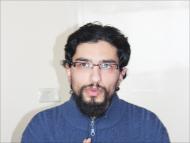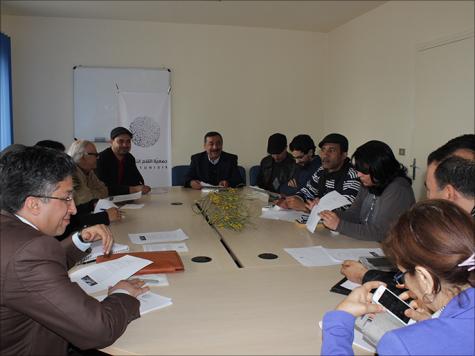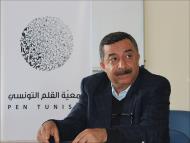The Association of Tunisian Pen Opens its Activity with Defying Cencorship
Kamel Riahi-Tunisia (Translated from Arabic by Ali Znaidi)
In its first activity, The Association of Tunisian Pen chose to stand in the face of censoring books manifested in the so-called the legal deposit and the declaration of literary works. This came in a meeting in which it was officially announced the establishment of the association and the composition of its elected executive body headed by poet Adam Fethi.
The first meeting of the association was attended by a number of creators, among them poet Adel Maizi, novelist Hedi Thabet, translator Jamel Jlassi, and philosophy researcher Adnen Jdey, and journalists and jurists, among them journalist Sihem Bensedrine who is one of the founders of the association years ago, and journalist and activist Naziha Rajiba (who is known as Om Zied).
From Existence to Action:
Speaking to aljazeera.net, the head of the association, poet Adam Fethi, said that Tunisian Pen was established years ago at the initiative of a group of female and male militants of the media and culture scene who believed that defending culture is defending the human being’s humanity and who insisted on activism despite the authority’s refusal to grant them the visa, and who were keen to support creators and media persons and to be a voice of the voiceless intellectuals who yearn for freedom and independence.
Fethi added that after 2011 many things have changed, but reality has soon proved to all that the fight is still going on and that the freedoms, and particularly the freedom of thought, the freedom of expression, the freedom of creativity, the freedom of media, and the free exchange of intellectual, creative and media production have not yet become a reality and they are still a newborn desirable dream which requires lots of care and vigilance to protect it from any hazard.
He pointed out that the association is preparing itself for this new stage with a new executive body based on a renewed certainty that the fight for the future for all the Arab countries is mainly a cultural fight.
For his part, secretary general of the association, caricaturist Tawfiq Omrane, asserted that the association abides by the Charter of International PEN which asserts that literature does not recognise borders and it must remain the common balance between all peoples, despite political turmoil.
He pointed out that its members at all the time consecrate all what they have of influence to serve the understanding between peoples and their living in an atmosphere of mutual respect and they are committed to doing all they can to eradicate all hatred that is based on reasons of race, class or nationality.
For his part, member of the executive body of the association, translator Jamel Jlassi, asserted that “Tunisian Pen” commits itself to defending the principle of free circulation of ideas and enjoining each of its members to do all what they can to face any constriction of freedom of expression in their country or in the group to which they belong, as well as in any place in the world.
Censorship and Self-censorship:

Adnen Jdey: Self-censorship is a means for intellectuals to absorb what the political sysyem wants (Al-Jazeera).
At the constituent meeting of the association, writer and jurist Moez Akaichi told the story of censoring books and the story of the legal deposit and its international history and he saw that it is linked to establishing big dictatorships and totalitarian regimes to control ideas and to spy on creators and thinkers.
Akaichi approached the Tunisian experience reviewing the attempts of the regimes and the rulers to control minds and to govern peoples considering them immature and unable to distinguish. Hence the leaking of an article of the constitution asserting the need for prior declaration of the content of literary works, as Akaichi said reminding of the books confiscated in the previous era as a result of this law.
For his part, Adnen Jdey – who lectured about self-censorship – said that the concept of self-censorship is located between two edges; the edge of the identification between the author and the censor and the edge of the introspection of authority and practicing its mechanisms according to the confusion imposed by the ethics of expression and thought.
Jdey added that self-censorship is the recourse of thinkers, researchers and writers to exercise control as a way to absorb what the political system wants and to adapt to it according to the red lines that are outlined and imposed by the religious, social and moral systems.
This article appeared in aljazeera.net 29/3/2014 by Kamel Riahi.
You can read the original text in Arabic here.
Translated from Arabic by Ali Znaidi.


